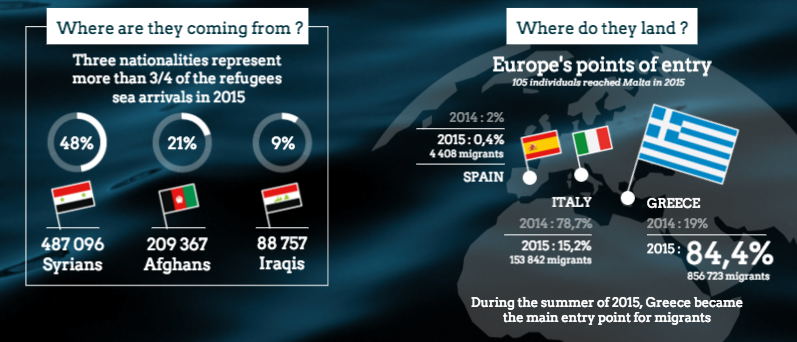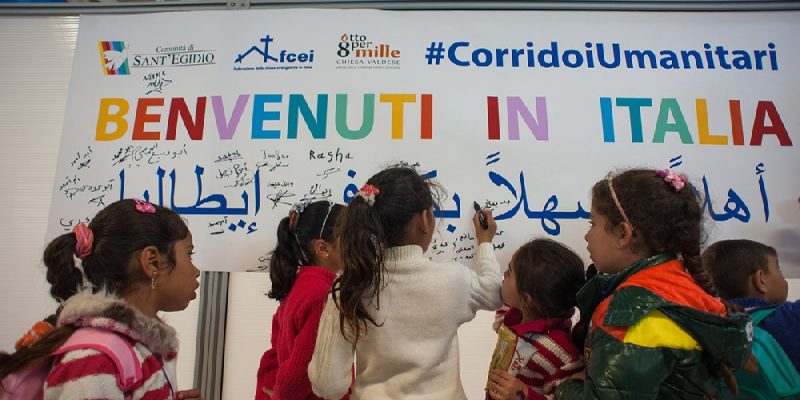1. The concrete possibility of humanitarian corridors
Thanks to the humanitarian corridors pilot project by the Evangelical Church Federation in Italy (FCEI), the Sant’Egidio Community and Tavola Valdese – which aims to welcome 1000 asylum seekers in two years – 100 Syrian refugees have already arrived in Italy at the end of February. This morning, a second group of 101 highly vulnerable people landed in Fiumicino.
In the meantime, Luigi Manconi, President of the Justice Committee of Senate, hopes that the example supplied by civil society will be soon followed by the government.
2. The alarming proposal of creating “floating hotspots”
A few days ago the Ministry of the Interior Angelino Alfano – accompanied by the commissioner for immigration Avramopoulos, the Frontex Agency Director and the representatives of the other European agencies such as Europol, Eurojust, EunavforMed and Easo – was in Catania for the opening of the Italian headquarters of the EU Task Force for immigration. Alfano took the opportunity to confirm his will to find an agreement with Libya and also to reiterate his intention to set up floating hotspots on rescue boats as soon as possible, in order to identify and fingerprint migrants before they get to the coasts. An alarming proposal from the guarantee of asylum seeker rights perspective but which is nonetheless being considered by the European authorities.
3.To #Rio2016, the Olympic flame brings to light the refugee crisis.
The Rio Olympic games will be remembered as the refugee Olympics. For the first time, a refugee team – including Yusra, the young Syrian swimmer who, with her sister, rescued 20 refugees from death by shipwrecking – will be participating in the Olympic competition. Furthermore, last week a Syrian refugee carried the Olympic torch in a migrants camp in Athens, truly shedding light on the refugee crisis.
The Olympics stand for solidarity and peace. That's why a Syrian refugee carried the torch through a migrant camp.https://t.co/45HhOhlatl
— Channel 4 News (@Channel4News) April 27, 2016
4. 7 out of 10 British would like to welcome more refugees
The past week, the British House of Commons’ rejection of an amendment to the immigration bill that would have enabled 3,000 unaccompanied minors from Syria to enter the United Kingdom got a lot of attention.
Only a few days after the controversial decision, a new poll by the BBC reveals that 72% of British would be in favour to extending a welcome to Syrian refugees. In the meantime, the Guardian documents the appalling conditions of unaccompanied children, let to themselves in the Calais Jungle.
Will all of this persuade the UK government to do more?
5. Who are the refugees coming to Europe by sea?
How many refugees arrive in our continent by sea? Where do they enter and came from? How fluxes and routes are evolving over time? The Paris Match’s info-graphic and the in-depth analysis with charts and tables by the Washington Post try to explain everything there is to know.

6. The human costs of Fortress Europe over the past fifteen years
For a long time, the journalist group behind the Migrant Files investigated and documented the human and financial costs of the European migration policies. This means discovering who benefits from human smuggling and above all counting the deads – one by one.
Based on the data that have been pooled in a meticulous way by The Migrants Files, a breathtaking interactive graphic was created. It takes only one click to start the travel over the last fifteen years of migrants deaths. Europe really do kill.
7. The refugee crisis is humanity’s crisis – says Bauman
“Refugees are world-less in a world that is spliced into sovereign territorial states, and that demands identifying the possession of human rights with state citizenship” says the great sociologist Zygmunt Bauman in an interview with Brad Evans of the New York Times.
A must read – maybe paired with Bauman’s editorial for Open Migration (with which we launched our project a few months ago).
8. Austrian bad immigration law and the UN critique
Bad days in Austria: a few days after the triumph of the extreme right in the first round of the presidential elections, the Austrian parliament approved a new immigration law that regulates the authority to systematic expulsions to the borders (like in Hungary) and – even for those who actually succeed in entering and gaining protection – severely limits asylum rights.
Amid strong criticism, the UN Secretary General also took a stand on the matter: Ban Ki-moon has indeed explicitly and severely spoken against terrible asylum policies of European countries… in a speech to the Austrian Parliament!
9. “We won’t turn back”: Ventimiglia chronicles
Before Idomeni and Calais, there was Ventimiglia. On year after in the Ligurian city the situation has barely improved. Vice News Italy documented the limbo of migrants who wants to cross the border with France –and who refuse to turn back- and the tensions between No Borders activists and police.
10. A message from Idomeni
The anger and frustration of thousands of people trapped in the European borders, the European policies folly – all reduced to a single sentence, on a tent in the Idomeni camp: “if you don’t like refugees coming to your country then stop voting for politicians who love to bomb the shit out of other countries”.
Idomeni, la rabbia sulla tenda: ''Se non ci volete a casa vostra non votate chi ci bombarda'' https://t.co/z3JAnYPB4P
— la Repubblica (@repubblicait) April 29, 2016









